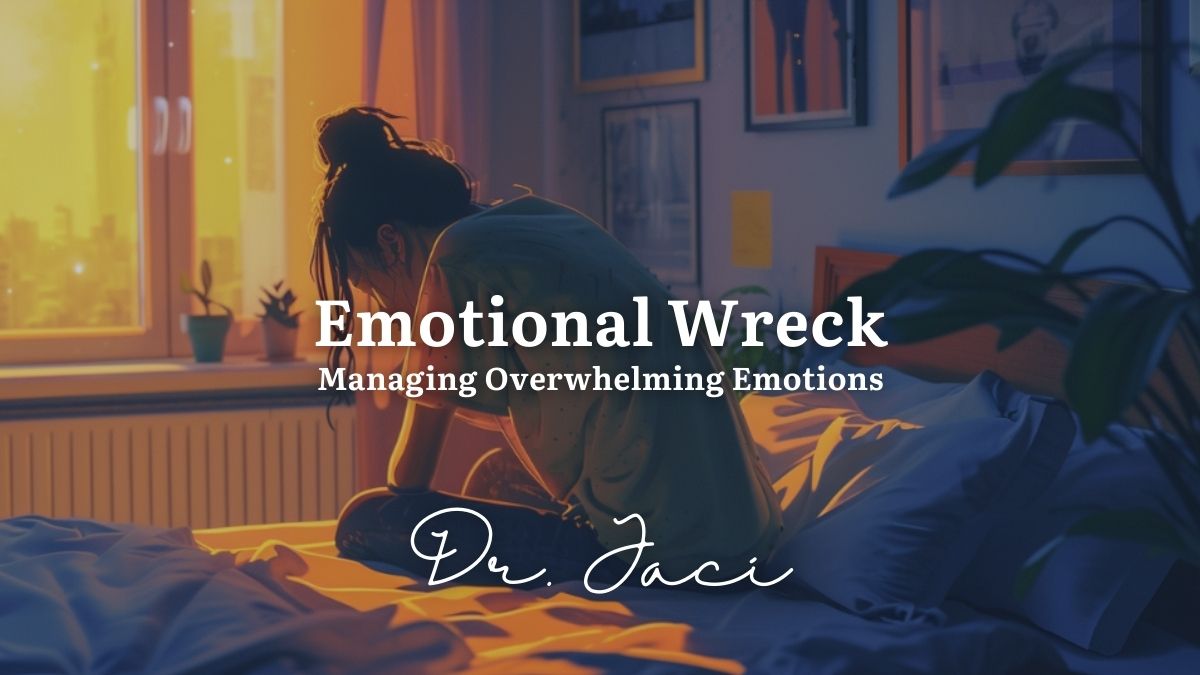Life often presents us with circumstances that can trigger a multitude of emotions, from joy and love to anger and sorrow.
However, when these emotions become too intense, constant, or unmanageable, one might find themselves in a state of emotional disarray often referred to as an “emotional wreck”.
As a clinical psychologist, I have worked with numerous clients who find themselves in this emotionally challenging state.
In this post, we’ll explore the nature of being an emotional wreck, its causes, effects, signs, coping strategies, and how to seek professional help.
Understanding Emotional Wreck: The Basics
Emotional health is as vital as physical health, but understanding our emotional state, especially during times of distress, can often be complex.
The term “emotional wreck” has increasingly found its way into our vernacular, representing a state of profound emotional turmoil.
But what exactly does it mean, and how does it manifest?
Let’s explore this in more detail.
What does “Emotional Wreck” mean?
In psychological terms, an emotional wreck refers to a state of extreme emotional distress.
This state arises when feelings become too intense, unyielding, or overwhelming to manage effectively.
The emotions involved are not limited to just sadness or despair, but can span a broad spectrum including anxiety, fear, anger, or frustration.
One’s emotional state, particularly when in distress, can significantly influence thought processes and actions.
In a study by Gross and Munoz (1995), the authors discuss how emotional regulation, the ability to manage and respond to an emotional experience, can impact psychological and social functioning.
When one is in a state of being an “emotional wreck”, their ability to regulate their emotions effectively is often impaired, leading to functional and social difficulties.
These individuals often lack the emotional bandwidth to handle stressful or triggering situations.
Different types of overwhelming emotions
Overwhelming emotions can manifest in various ways, making them challenging to recognize or understand.
For instance, someone might find themselves worrying incessantly about future events, a manifestation of anxiety.
Another person may experience episodes of rage or uncontrollable crying, which could be indicative of a more complex emotional state like depression or a personality disorder.
Research in psychopathology suggests that intense, prolonged periods of specific emotions could signify underlying mental health conditions.
For instance, constant worry and nervousness could be symptoms of Generalized Anxiety Disorder, while recurrent episodes of rage could be related to Intermittent Explosive Disorder.
Understanding these types of overwhelming emotions is critical as it is often the first step towards seeking help and managing them effectively.
However, it is essential to remember that having overwhelming emotions does not necessarily mean you have a mental health condition.
Life circumstances, stress, and other environmental factors can often lead to periods of emotional distress.
It’s when these feelings become chronic, unmanageable, and affect daily functioning that professional help may be needed.
Causes of Being an Emotional Wreck

The complexities of our emotional states are often tied to an array of factors that span our personal lifestyles, psychological experiences, and the environments in which we find ourselves.
The same is true for becoming an emotional wreck, a state of heightened emotional distress that can be influenced by lifestyle, psychological, and environmental factors.
Lack of Sleep
Sleep is essential for our physical and mental health.
Multiple studies have shown the effects of sleep deprivation on mood and emotional regulation.
One meta-study found that sleep deprivation significantly impairs mood, cognitive functions, and motor performance.
A lack of sleep could exacerbate emotional distress, making it more difficult for individuals to regulate their emotions effectively.
Poor Nutrition
Similarly, the role of nutrition in mental health is increasingly being recognized.
Dietary patterns, particularly those high in processed foods and sugars, are associated with an increased prevalence of mental health issues, including depression and anxiety.
Physical Inactivity
Physical activity is not only beneficial for physical health but it’s also known to improve mental health.
It’s often something I recommend to clients who do not currently have a workout routine.
Regular exercise has been linked to reduced symptoms of depression and anxiety and improved mood
Psychological Factors
Our psychological well-being plays a pivotal role in our emotional states.
Numerous factors, including past traumas, significant life changes, and chronic mental health conditions, can substantially influence our emotions, potentially leading to periods of extreme emotional distress or the state colloquially referred to as being an “emotional wreck.”
Trauma and Life Changes
Experiences with trauma or substantial life changes can precipitate extreme emotional responses.
Events such as the loss of a loved one, divorce, or job loss can trigger profound emotional turmoil and dramatically increase the risk of becoming emotionally overwhelmed.
Various studies have illuminated the connection between such experiences and increased risk for mental health issues.
Research indicates that almost half of individuals who undergo a traumatic event will experience at least one major depressive episode in their lives.
Significant life changes can lead to periods of extreme stress, known as adjustment disorders.
These disorders are characterized by emotional or behavioral symptoms that occur in response to identifiable stressors and can significantly disrupt daily functioning.
Chronic Conditions
Chronic mental health conditions like depression, anxiety disorders, and personality disorders can also contribute significantly to states of emotional distress.
These conditions are characterized by emotions that are intense, persistent, and interfere with daily functioning.
Depression, for example, is characterized by persistent feelings of sadness, hopelessness, and a lack of interest or pleasure in activities.
These symptoms are so prevalent and severe that they interfere with an individual’s ability to function in their daily life.
Similarly, anxiety disorders involve excessive and chronic worry that interferes with daily life.
People with anxiety disorders often find it difficult to control their worry, leading to restlessness, fatigue, difficulty concentrating, irritability, and sleep disturbances.
Finally, personality disorders, such as borderline personality disorder (BPD), are characterized by longstanding patterns of thought and behavior that are maladaptive and inflexible.
These patterns often lead to emotional instability, impulsive behavior, and intense but unstable relationships, which can create a constant state of emotional upheaval.
Environmental Factors
Finally, the environment in which we live and work can either contribute to or alleviate emotional distress.
High-pressure work environments that demand long hours, high levels of responsibility, or frequent interaction with challenging situations can lead to chronic stress, which in turn can result in emotional distress.
Likewise, relationships characterized by constant conflict, whether familial or romantic, can contribute to emotional distress.
Such environments often create a sense of instability and anxiety, which can escalate feelings of emotional turmoil.
Recognizing Signs of Emotional Distress

Understanding the signs of emotional distress can often be the first step towards seeking help.
Emotional distress can manifest in various physical and psychological signs.
Recognizing these signs in oneself or others can be key in ensuring the right support is provided.
Headaches
Headaches, especially tension-type headaches, can be a common physical symptom of emotional distress.
According to one study, emotional distress, particularly when it is chronic, can increase the frequency and severity of tension headaches.
Upset Stomach
Gastrointestinal issues, such as an upset stomach, can also be a symptom of emotional distress.
The gut-brain connection has been well-established, with research suggesting that psychological stress or distress can negatively impact gut health, leading to symptoms like stomachaches.
Changes in Appetite or Sleep Patterns
Alterations in appetite or sleep patterns are also common signs.
Some individuals may experience insomnia or hypersomnia (excessive sleep), loss of appetite or overeating when they’re experiencing emotional distress.
The relationship between sleep, appetite, and mood has been highlighted in various studies, emphasizing how changes in one can influence others.
Frequent Mood Swings
Experiencing frequent and intense mood swings can be indicative of emotional distress.
These mood swings can range from feelings of happiness and euphoria to feelings of sadness, anger, or hopelessness, often occurring without a clear reason.
Persistent Feelings of Sadness or Worry
Persistent feelings of sadness or worry that interfere with daily functioning can be signs of emotional distress.
These feelings are often disproportionate to the situation at hand or may arise without any particular cause.
Feelings of Hopelessness
Lastly, feelings of hopelessness or pessimism about the future are often associated with high levels of emotional distress.
These feelings can contribute to a cycle of distress, often making it more challenging to overcome the emotional turmoil.
Emotional Wreck Coping and Professional Help
Feeling emotionally overwhelmed can be challenging, but there are various coping strategies and professional options to help manage such feelings effectively.
Emotional Regulation Techniques
Emotional regulation techniques can be beneficial in managing overwhelming emotions. These techniques focus on recognizing and adjusting emotional responses.
Deep Breathing
Deep breathing is a simple yet effective strategy for calming the mind and body.
It helps to slow your heart rate and lower blood pressure, promoting a sense of calm.
Progressive Muscle Relaxation
Progressive muscle relaxation (PMR) involves tensing and then releasing different muscle groups in the body.
This technique can help reduce feelings of anxiety and physical symptoms of stress.
Mindfulness
Mindfulness involves focusing on the present moment without judgment.
It promotes acceptance of one’s feelings and thoughts, which can help reduce distress (Hölzel et al., 2011).
Seeking Professional Help for Emotional Distress
When overwhelming emotions persist or interfere with daily life, it’s crucial to seek professional help.
When to Seek Help
It’s time to seek help when your emotional state begins to interfere with your ability to function in daily life, affects your relationships, or results in a persistently depressed mood or anxiety.
Types of Therapy for Emotional Control
Different types of therapy can help improve emotional control.
Cognitive-behavioral therapy (CBT) can help individuals challenge and change unhelpful thinking patterns and behaviors, leading to improved emotional regulation and coping skills.
Dialectical behavior therapy (DBT), another form of cognitive therapy, specifically focuses on providing therapeutic skills in four key areas: mindfulness, distress tolerance, emotional regulation, and interpersonal effectiveness.
This therapy can be particularly beneficial for those struggling with emotion regulation.
FAQ
Why am I an emotional wreck?
Many factors can lead to becoming an emotional wreck, such as lifestyle, psychological, and environmental factors.
What’s another word for emotional wreck?
Synonyms for emotional wreck could include emotionally distraught, overwhelmed, emotionally exhausted, or overwrought.
How do you use the word emotional wreck?
“Emotional wreck” is often used to describe someone who is experiencing intense, overwhelming emotions that are difficult to manage. For example, “After the loss of her job, she felt like an emotional wreck.”
What are the physical symptoms of emotional release?
Physical symptoms of emotional release may include crying, shaking, headaches, changes in appetite or sleep, and digestive problems.
How do I stop being an emotional wreck?
Practicing emotional regulation techniques, maintaining a healthy lifestyle, seeking professional help when needed, and building emotional resilience are effective strategies to stop being an emotional wreck.
Is emotional breakdown crying?
An emotional breakdown can involve crying, but it can also include other symptoms like feelings of despair, anxiety, and physical exhaustion.
What is an emotional wreck person?
An emotional wreck person is someone who is experiencing intense, unmanageable emotions, often due to stressors or significant life events.
What is an emotional breakdown?
An emotional breakdown, also known as a nervous breakdown, is a period of intense mental distress where you’re unable to function in your everyday life. Symptoms can include extreme emotional reactions, withdrawal from activities, and physical symptoms like headaches and sleep disturbances.

